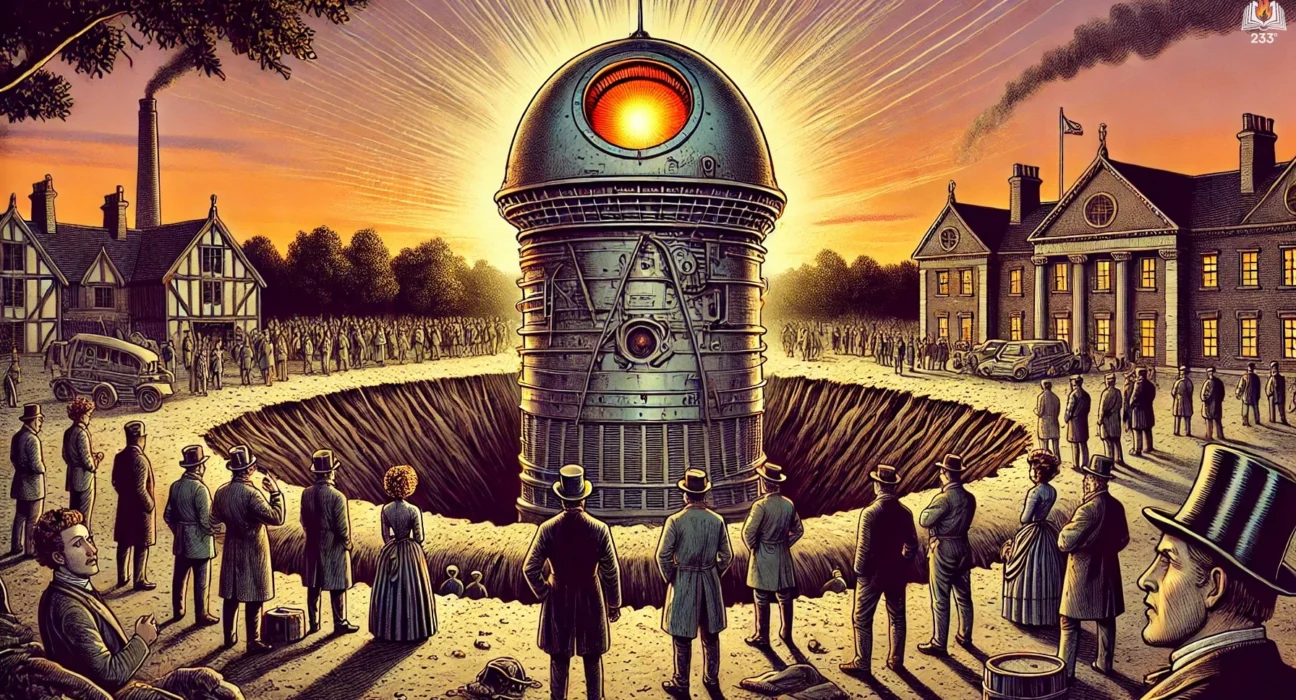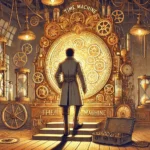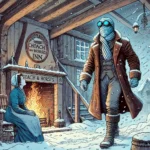The War of the Worlds, written by H.G. Wells and first published in 1898, is a groundbreaking work of science fiction that explores the conflict between Earth and an invading Martian species. It is considered one of the earliest stories to depict an alien invasion and has had a lasting influence on the genre. Set in England, the novel presents a gripping narrative about human survival in the face of an overwhelming extraterrestrial threat, highlighting themes of human fragility and technological hubris.
Plot Summary
The evening sky glowed a peaceful amber over the tranquil English countryside, but in the last years of the 19th century, few suspected that something far more sinister than a passing comet was descending upon the Earth. From across the vast, empty reaches of space, the Martians had been watching, planning, and preparing. These were no ordinary visitors; their intellects were as cold and calculating as the vast distances between the stars. The Martians were in desperate need of a new world, for their own had grown old and hostile. And so, they cast their eyes towards Earth—lush, vibrant, and brimming with life.
It began innocently enough. A streak of light shot across the sky one evening, falling over the sleepy English village of Woking. Most dismissed it as a meteor, a common enough occurrence. But Ogilvy, an astronomer, was curious. Early the next morning, he set out to investigate. There, on Horsell Common, he discovered the source of the falling star: a massive, cylindrical object half-buried in the earth. As Ogilvy approached, the cylinder emitted strange noises, but its surface was still too hot to examine closely.
As more people arrived to see the marvel, curiosity quickly turned to dread. The top of the cylinder began to unscrew. A collective gasp spread through the crowd, which quickly turned to horror as the Martians inside emerged—gigantic, grotesque creatures with oily, grey skin and massive, unblinking eyes. They were unlike anything the world had ever seen, monstrous beings that stood on powerful, writhing tentacles. And then came the heat-ray—a weapon beyond comprehension. It lashed out from the pit, incinerating everything in its path. Trees, houses, people—everything was engulfed in flames. Panic erupted as the crowd fled from Horsell Common, but the Martians had only begun their attack.
The narrator, a quiet, contemplative man living nearby, witnessed the terror firsthand. His calm life was shattered as the Martians advanced, their towering war machines—a horrifying fusion of technology and biology—lumbering across the countryside. The great tripods moved with terrifying speed, their heat-rays cutting down anyone who dared stand in their way. Whole towns were obliterated, and the roads became rivers of refugees as people fled in every direction. The army fought bravely, but rifles and artillery proved useless against the invaders’ shields.
In the midst of this chaos, the narrator was separated from his wife as he sent her to safety. Alone, he wandered the wreckage of his homeland, encountering others who were struggling to survive in this new world. Among them was a clergyman, the Curate, whose faith had been shattered by the sheer terror of the invasion. Together, they found refuge in a small house near one of the Martian landing sites, but their time there was fraught with fear. They could hear the mechanical whirring of the Martians, feel the ground tremble beneath their feet, and see the horror of the black smoke—a deadly Martian chemical weapon—spreading through the air, suffocating all life in its wake.
As the days passed, the narrator witnessed the mental collapse of the Curate, whose broken mind could not comprehend the invasion. His loud prayers and outbursts of despair attracted the attention of the Martians. In a desperate act, the narrator struck the Curate unconscious to silence him, but it was too late. The Martians heard, and they tore the house apart, dragging the Curate away, leaving the narrator to hide in terror.
In the days that followed, the narrator wandered through a desolate landscape, observing the full devastation wrought by the Martians. The once-thriving countryside had been reduced to ruins, and London, too, was silent, its streets emptied of life. During his wanderings, he met an artilleryman, one of the few survivors who still harbored hope. The artilleryman dreamed of rebuilding human civilization underground, away from the gaze of the Martians. He spoke of a future where mankind would fight back, living like rats in the sewers and tunnels, waiting for their moment to strike. But the narrator soon realized that the artilleryman’s plans were grandiose dreams built on delusions. The man had no real intention or capability to act, and so the narrator left him behind.
Driven by despair and curiosity, the narrator ventured into the heart of London, expecting to meet his end. The city, once bustling with life, was eerily quiet, overrun by the Martians. He stumbled upon their towering tripods, their strange machinery, and the horrifying red weed—an alien plant that had spread across the land like a plague. But as he moved closer, he noticed something astonishing: the Martians were dead. Their towering machines stood still, lifeless, and the Martians lay strewn about, their bodies decayed and motionless.
In a twist of fate, the invaders had been undone not by mankind’s efforts, but by the smallest creatures on Earth—bacteria. The Martians, with all their superior technology, had no immunity to Earth’s simplest organisms. The invincible enemy had been defeated by nature itself, and life on Earth began to stir once more.
In the aftermath, the narrator reunited with his wife, and society slowly began to rebuild. But the shadow of the Martian invasion lingered. The narrator, forever changed by the horrors he had witnessed, could not shake the memory of the invaders. The knowledge that mankind had come so close to annihilation haunted him, a reminder that despite all our intelligence and achievements, we remain vulnerable to the vast and unknowable forces of the universe.
Main Characters
The Narrator – The unnamed protagonist of the novel, the narrator is an intellectual observer who recounts the Martian invasion. His journey, filled with fear and introspection, mirrors humanity’s confrontation with its vulnerability. He struggles between panic and survival, embodying the average person caught in the chaos.
The Narrator’s Brother – Although a secondary character, the narrator’s brother offers another perspective on the Martian invasion as he tries to escape from London. His experiences show the broader societal collapse and panic, offering a contrast to the narrator’s introspective ordeal.
The Curate – A clergyman who accompanies the narrator for a portion of the story, the Curate’s faith disintegrates under the pressure of the invasion. His mental breakdown reflects the struggle between faith and despair in a world that seems abandoned by any higher power.
The Artilleryman – A soldier the narrator meets, the Artilleryman is initially portrayed as resourceful and determined to resist the Martians. However, his grand plans to build a new society ultimately reveal his delusions and inability to act, representing the human desire for survival but also the limits of ambition.
Theme
Survival and Human Fragility – The novel is a meditation on humanity’s vulnerability when faced with forces beyond its control. The Martians, with their superior technology, are an existential threat that humans are ill-prepared to confront, highlighting our fragility in the face of natural and technological disasters.
Colonialism and Invasion – Wells draws parallels between the Martian invasion and European imperialism. Just as the British Empire conquered less advanced societies, the Martians treat humans as inferior creatures, illustrating the dehumanizing nature of colonialism.
Faith vs. Reason – Through characters like the Curate, Wells explores the tension between religious faith and scientific rationalism. The Curate’s breakdown in the face of the invasion symbolizes the failure of faith to explain or cope with the overwhelming crisis, while the narrator represents a more empirical, rational approach to survival.
Human Arrogance and Complacency – The early chapters emphasize humanity’s complacency in its perceived superiority. The sudden and brutal arrival of the Martians disrupts this arrogance, exposing the limits of human knowledge and technology. This theme echoes Wells’ critique of human hubris in the face of nature’s unpredictability.
Writing Style and Tone
H.G. Wells employs a journalistic, matter-of-fact narrative style in The War of the Worlds, which enhances the novel’s sense of realism and immediacy. This style allows readers to feel as though they are reading a firsthand account of the Martian invasion, heightening the tension and fear. Wells blends detailed scientific explanations with vivid descriptions of destruction, using a formal yet accessible prose that was advanced for its time. His use of a first-person narrator adds to the personal, introspective nature of the novel, offering a window into the human psyche as it faces existential threats.
The tone of the novel is bleak and often filled with existential dread. Wells balances moments of quiet contemplation with scenes of chaos and violence, maintaining a tense atmosphere throughout. The tone shifts between despair and a faint hope, reflecting the uncertainty and terror of an apocalyptic event. Wells also integrates social commentary, critiquing human society and its weaknesses, which lends the narrative a didactic edge without compromising its dramatic tension.
We hope this summary has sparked your interest and would appreciate you following Celsius 233 on social media:
There’s a treasure trove of other fascinating book summaries waiting for you. Check out our collection of stories that inspire, thrill, and provoke thought, just like this one by checking out the Book Shelf or the Library
Remember, while our summaries capture the essence, they can never replace the full experience of reading the book. If this summary intrigued you, consider diving into the complete story – buy the book and immerse yourself in the author’s original work.
If you want to request a book summary, click here.
When Saurabh is not working/watching football/reading books/traveling, you can reach him via Twitter/X, LinkedIn, or Threads
Restart reading!








